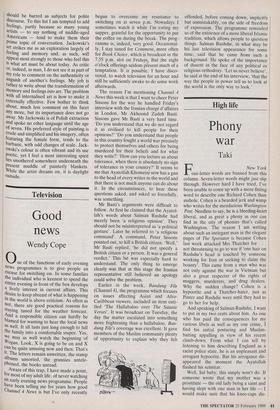Television
Good news
Wendy Cope
0 ne of the functions of early evening news programmes is to give people an excuse for switching on. In some families the individual who is keenest to spend the entire evening in front of the box develops a lively interest in current affairs. This desire to keep abreast of what is happening In the world is above criticism. As often as not, there are good practical reasons for staying tuned for the weather forecast. And a responsible citizen can hardly be blamed for wanting to hear the local news as well. It all lasts just long enough to lull the family into a comfortable stupor. Yes, we may as well watch the beginning of Wogan. Look, X is going to be on and X can be quite amusing now and then. That's It. The letters remain unwritten, the stamp albums unsorted, the grannies untele- Phoned, the books unread.
Aware of this trap, I have made a point, for most of my adult life, of never watching an early evening news programme. People have been telling me for years how good Channel 4 News is but I've only recently begun to overcome my resistance to switching on at seven p.m. Nowadays I sometimes watch it while I'm eating my supper, grateful for the opportunity to put the coffee on during the break. The prog- ramme is, indeed, very good. Occasional- ly, I stay tuned for Comment, more often for Book Choice, which is broadcast in the 7.55 p.m. slot on Fridays. But the eight o'clock offerings seldom present much of a temptation. It is possible, I have disco- vered, to watch television for an hour and still be sufficiently awake to do some work afterwards.
The reason I'm mentioning Channel 4 News this week is that I want to cheer Peter Sissons for the way he handled Friday's interview with the Iranian chargé d'affaires in London, Mr Akhoond Zadeh Sissons gave Mr Basti a very hard time. 'Do you understand that we do not regard it as civilised to kill people for their opinions?' Do you understand that people in this country fought a world war precisely to protect themselves and others for being murdered for their beliefs and for what they write?' How can you lecture us about tolerance, when there is absolutely no sign of tolerance in your country?' It seems to me that Ayatollah Khomeini now has a gun to the head of every writer in the world and that there is not much anyone can do about it. In the circumstances, to hear these questions asked, and asked so forcefully, was something.
Mr Basti's arguments were difficult to follow. At first he claimed that the Ayatol- lah's words about Salman Rushdie had merely been 'a religious opinion'. They should not be misinterpreted as 'a political gesture'. Later he referred to 'a religious command'. A command, Peter Sissons pointed out, to kill a British citizen. 'Well,' Mr Basti replied, 'he did not specify a British citizen or a person. It was a general verdict.' This bit was especially hard to understand. The only thing to emerge clearly was that at this stage the Iranian representative still believed an apology could solve the problem.
Earlier in the week, Bandung File (Channel 4), the programme which focuses on issues affecting Asian and Afro- Caribbean viewers, included an item enti- tled 'The Hullabaloo over The Satanic Verses'. It was broadcast on Tuesday, the day the matter escalated into something more frightening than a hullabaloo. Ban- dung File's coverage was excellent. It gave members of the Muslim community plenty of opportunity to explain why they felt offended, before coming down, implicitly but unmistakably, on the side of freedom of expression. The programme reminded us of the existence of a more liberal Islamic tradition, which allows people to question things. Salman Rushdie, in what may be his last television appearance for some time, said that he came from such a background. He spoke of the importance of dissent in the face of any political or religious orthodoxy. 'Let us never believe', he said at the end of his interview, 'that the way the people in power tell us to look at the world is the only way to look.'
















































 Previous page
Previous page